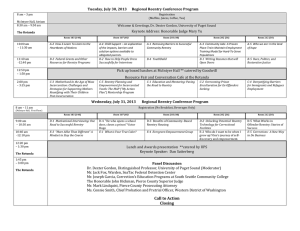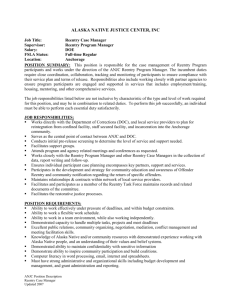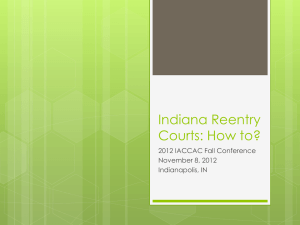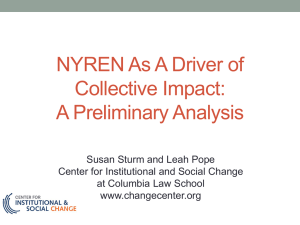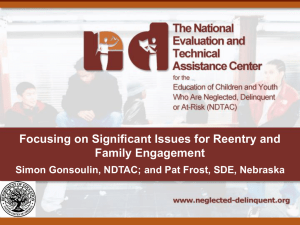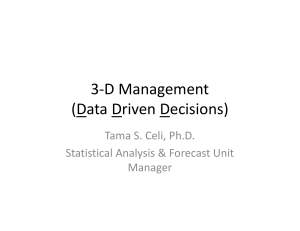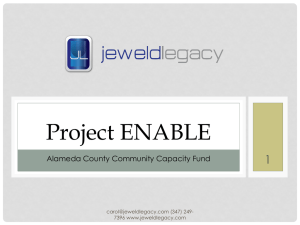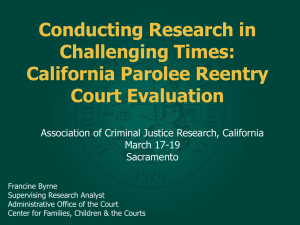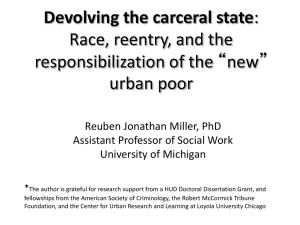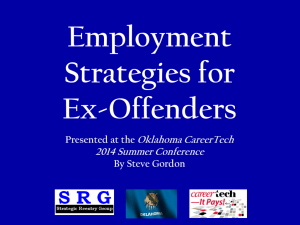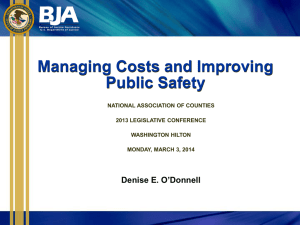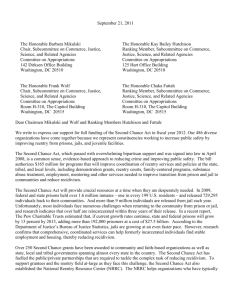PowerPoint - Further The Work
advertisement
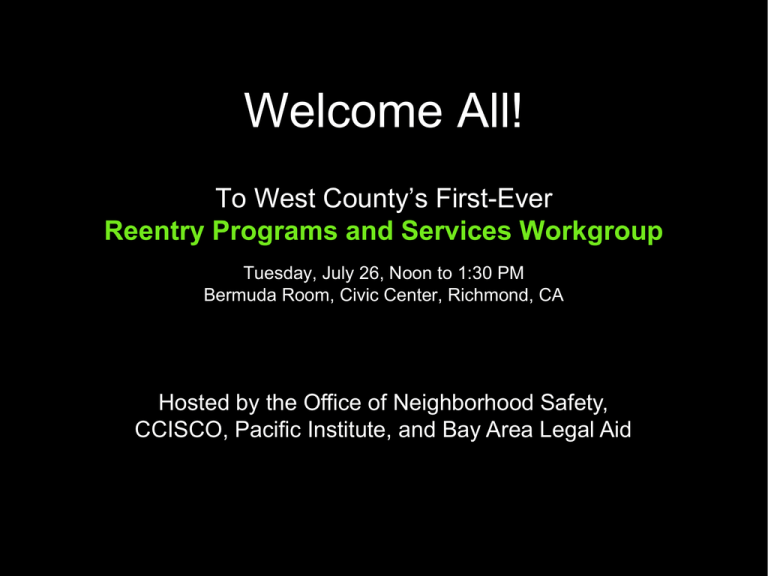
Welcome All! To West County’s First-Ever Reentry Programs and Services Workgroup Tuesday, July 26, Noon to 1:30 PM Bermuda Room, Civic Center, Richmond, CA Hosted by the Office of Neighborhood Safety, CCISCO, Pacific Institute, and Bay Area Legal Aid • • • • • • Agenda for Today 12:00-12:15 Introduction & Context: Who’s here and why we’re here 12:15-12:25 Workgroup approach 12:25-12:40 Review of current findings 12:40-1:00 Small group discussion: Two Questions 1:00-1:20 Report out, finding themes 1:20-1:30 • • • • Next steps, meeting dates and place Last Tuesday of every month, Noon to 2 PM Dates: Aug. 30, Sept. 27, Oct. 25, Nov. 29, NOT in Dec., Jan. 31 July & August meetings in Bermuda Room at Civic Center Plaza Sept, Oct., Nov., & Jan meetings at East Bay Center for the Performing Arts, 11th and Macdonald Context For Today’s Meeting: Who’s Doing What 1. Contra Costa County 1. 2. Office of Neighborhood Safety 1. 3. 4. 6. 7. 1. Developing a Ceasefire anti-violence initiative and employing community policing methods 2. Working with probation, parole on compliance checks to ensure that returning residents adhere to local & state laws Contra Costa Interfaith Supporting Community Organization (CCISCO) Developing Richmond Now: A Total Plan for Safety and Opportunity Pacific Institute’s Safe Return Team 1. Conducting local research 2. Advocating for the development of a One Stop Service Center for reentering residents Bay Area Legal Aid 1. Received a grant to support the coordination of local efforts related to reentry 2. Will host the Programs and Services workgroup meetings for the next year Service Providers (multiple CBOs and public agencies doing direct work) 1. 8. Developing the city’s strategic plan for reentry: Greater Richmond Community Reintegration Planning Framework Richmond Police Department 1. 5. Developed a county-wide strategic plan for reentry Public agencies and nonprofit community-based organizations Further The Work 1. Hired by Bay Area Legal Aid to provide research, project management, and facilitation Why We’re Here • • • Turning the Plan into Action The Richmond Reentry Strategic Plan has developed an infrastructure plan to improve reentry in our community. It defines several functions within this infrastructure: Three (age-defined) Community Hubs, a Management Services administrative body, an Information and Communications committee, and a Programs and Services committee. Today’s meeting is to intended to launch the Programs and Services committee, inviting participation and beginning the work of developing the group’s goals and responsibilities. Knowledge and Needs: Workgroupby toONS, Advance Intentional Efforts •P&S Sponsored hosted by Bay Legal, facilitated by Further The Work, and in partnership with all of you, over the next year the P&S Workgroup will work together to strengthen the reentry system and improve the reentry experience in West Contra Costa County. Workgroup Structure “Knowledge and Needs” • Year-long process with monthly meetings • Goals-focused, task-driven • Process-management and project support provided by Bay Legal and Further The Work (logistics, communications, meeting design and facilitation; research and analysis as needed), under guidance by ONS/CCISCO/Pacific Institute • Occasional work assignments between meetings and decisions/learning/next steps at meetings • Facilitated and structured: We promise that there will be a purpose and an outcome to each meeting (learning, presentation, analysis, training, discussion, decision-making). What We Know • • • From 2002-2007, the Urban Institute conducted a national, multi-site study – the Serious and Violent Offender Reentry Initiative (SVORI) – to examine the pre- and post-release risks and needs of serious and violent offenders under age 35 exiting incarceration. The most requested reentry needs were education (94% requested such services), financial assistance (86%), driver’s license/state ID (83%), job training (82%), and employment (80%). In 2011, Pacific Institute’s Safe Return Team conducted a survey of over 100 people returning here after incarceration. Their findings are consistent with those of the SVORI study. Desired Service Types 1. Identified by SVORI Coordination and Supervision, both pre- and post-release, including needs assessment, case management, treatment/release planning, and post-release reintegration support and supervision; 2. Employment, Education and Skills-Building, including structured education/vocational training, work readiness training, job coaching, life-skills support, money management, and support for developing positive relationships, attitudes, and behaviors; 3. Health Services, including medical, dental, prescriptions, substance abuse treatment and mental health services; 4. Transition Services, including legal and benefits assistance, financial support and emergency assistance, peer support, mentoring, housing, and transportation Barriers to Success Identified by SVORI • • • Inadequate information and referral, including outdated information, lack of awareness about available programs, inconsistent reliability of referral agreements, and poor communication among service providers regarding individual clients; Programmatic barriers, including poor program quality and inadequate program capacity to meet needs in a timely way; Individual-level factors, such as lack of transportation, inadequate capacity to manage complex information, inadequate skills in coping with psychosocial challenges and frustrations, and complicating underlying factors such as serious mental health and substance abuse problems. What Stands in Our Way? •Two Questions: 1.What single thing, if changed, could improve your experience related to reentry? • Examples: “If I had access to a list of employers who would consider hiring people with felony convictions.” “If the parole department would really work with my agency to develop a customized mix of services needed for a given individual.” “If I could be certain that when I refer a client to another agency, that agency would actually provide good services.” “If we had an accurate pre-release needs assessment.” “If witnesses felt more comfortable reporting information to us.” 1.What thing, if available to all of us, might benefit all of us: • Examples: “If we had ready access to training in best practices.” “If we had some standard data elements that all service providers agreed to gather.” “If we had a centralized calendar and communications method.” “If we had access to a real analysis of the current services and gaps, with recommendations for how to make it better.” “If funders had a better idea of how to support multiple agencies in one shared project.” Next Steps • • • • If you’d like to participate as on ongoing member of the Programs and Services workgroup, please sign up now: Just text the word reentry to 22828. Bay Legal and Further The Work will review today’s outcomes and produce a report to help identify common areas of interest, priorities, and training opportunities. Working with the strategic planning group, Bay Legal and Further The Work will develop materials and an agenda for the August 30 meeting. We hope you’ll join us! Meeting Dates •How Often: Last Tuesday of every month •What Time: Noon to 1:30 PM; bring your own lunch •Dates & Places: •August 30: Bermuda Room, Civic Center Plaza, Richmond •Sept. 27: East Bay Center for the Performing Arts, 11th and Macdonald •October 25: East Bay Center for the Performing Arts •November 29: East Bay Center for the Performing Arts •No meeting in December •January 31: East Bay Center for the Performing Arts •To sign up on the P&S list, just text the word reentry to 22828 •To download these slides, go to FurtherTheWork.com/publications.html
